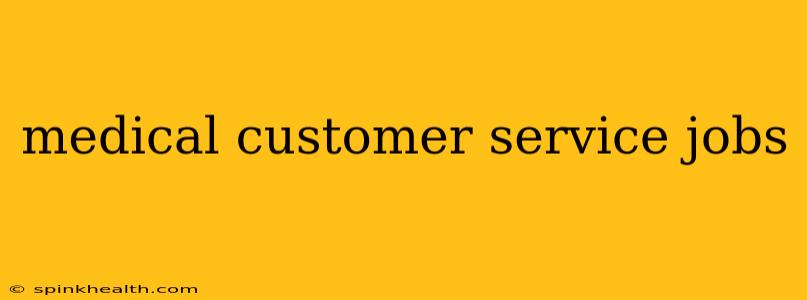Answering the Call: A Deep Dive into Medical Customer Service Jobs
The world of healthcare is constantly evolving, and with that evolution comes a growing need for compassionate and skilled individuals in medical customer service. It's more than just answering phones; it's about navigating complex medical information, empathizing with patients during stressful times, and ensuring a smooth and positive experience for everyone involved. This isn't your average customer service role; it's a career that directly impacts people's health and well-being.
Let's explore the multifaceted landscape of medical customer service jobs, uncovering the different roles, required skills, and rewarding aspects of this vital profession.
What are the different types of medical customer service jobs?
The beauty of this field lies in its diversity. You won't find a one-size-fits-all description. Medical customer service roles span a wide spectrum, each with its own unique set of responsibilities and challenges. Some common examples include:
- Medical Office Receptionist: The front-line warriors, these individuals are the first point of contact for patients. They schedule appointments, answer phones, manage patient records, and ensure the smooth flow of the clinic or office.
- Patient Account Representative: These professionals handle the financial aspects of healthcare, assisting patients with billing inquiries, insurance claims, and payment arrangements. This requires a keen eye for detail and a solid understanding of medical billing codes.
- Medical Billing and Coding Specialist: While not strictly customer service, these roles often involve significant interaction with patients and insurance companies to clarify billing issues and ensure accurate processing of claims.
- Health Insurance Customer Service Representative: These roles focus specifically on assisting patients with understanding their insurance coverage, benefits, and claims processes. They often act as a liaison between patients and insurance providers.
- Call Center Representative for Healthcare Providers: Many large healthcare systems operate call centers to handle a high volume of patient inquiries, appointment scheduling, and general information requests.
- Telehealth Customer Service Representative: The rapidly growing field of telehealth requires dedicated customer service professionals to assist patients with scheduling virtual appointments, troubleshooting technical issues, and providing general support.
What skills are needed for medical customer service jobs?
Beyond the usual customer service skills (patience, empathy, clear communication), medical customer service demands a specialized skillset:
- Medical Terminology: Understanding medical jargon is crucial for effectively communicating with patients and healthcare professionals.
- HIPAA Compliance: Strict adherence to HIPAA regulations regarding patient privacy and confidentiality is paramount.
- Insurance Knowledge: Familiarity with different insurance plans and billing procedures is often essential.
- Electronic Health Records (EHR) Systems: Proficiency in using EHR software is becoming increasingly important.
- Problem-Solving Skills: Medical customer service often involves troubleshooting complex issues and finding solutions for patients.
- Multitasking Abilities: Handling multiple tasks simultaneously – answering phones, scheduling appointments, and managing records – is a daily reality.
What is the salary range for medical customer service jobs?
Salaries vary widely based on experience, location, employer, and specific role. Entry-level positions may start in the $30,000-$40,000 range, while more experienced professionals or those in specialized roles can earn significantly more.
What is the job outlook for medical customer service jobs?
The job outlook for medical customer service is excellent. The aging population and the continued growth of the healthcare industry ensure a high demand for skilled professionals in this field for the foreseeable future.
How can I find medical customer service jobs?
Numerous avenues exist for finding these positions:
- Online Job Boards: Indeed, LinkedIn, Monster, and specialized healthcare job boards are great starting points.
- Networking: Connecting with healthcare professionals in your network can lead to valuable insights and potential opportunities.
- Company Websites: Check the career pages of hospitals, clinics, and healthcare organizations directly.
The path to a fulfilling career in medical customer service is paved with compassion, dedication, and a desire to make a real difference in people's lives. It's a field that constantly evolves, offering diverse opportunities for growth and advancement. If you possess a strong work ethic, a passion for helping others, and a willingness to learn, this could be the perfect career path for you.

